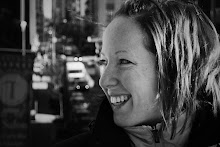
We eat cottage pies and sticky toffee pudding. We actually have soft spots for both. Spotted dick is on my list.
There's quite a bit these days that feels normal. We know that a "surgery" is a doctor's office. "Pudding" means dessert. And a "lift" is another (better?) word for elevator. And we're completely comfortable using those words.
For one thing, it's just inevitable that we start using British terms instead of their American counterparts. When we have to interact with the outside world, it's nice to avoid blank stares. Why make things more difficult than they have to be, when we can just as easily discuss "car parks," "cots," and "holidays" (parking lots, cribs, and vacations)?
More than that, however, we make a conscious effort to use British words when we're talking to Caroline. She'll probably go off to school in the next 6 months, and we don't want her to be completely clueless about "ice lollies," "nappies," and "rubbish bins" (popsicles, diapers, and trash cans). In fact, she would tell you that she rides around in her "buggy" (stroller) and that Juliet sucks on a "dummy" (pacifier). And "Mummy"? Yes, it's what I hear when she's whiny. Mummy-mummy-mummy-mummy. Just as fun as you might think.
And when we send her to school? The terms are all different. Instead of preschool she'll go to "nursery." But when she plays with the other young kids while Josh and I are sitting in church? It's call "creche."
All of that feels normal. But we're still getting used to a few things.
The spelling trips me up all the time. Typing "water color paints" into the search field at amazon.co.uk doesn't turn up much. Because of course, they're "water colours." And then there's "fertiliser." And "tyres" (as in car tires). Since Josh operates within the professional world, he has to deal with this a lot more. Not too many people care about what goes into my email correspondence.
I learned yesterday via Wikipedia that the "rocket" I'm always eating on sandwiches and in salads is actually arugula. Good to know. Thank goodness for the Internet. I recently had to Google what my English friends meant when they would sign off emails and texts with an "x" or "xx." Like I figured, it just means "kiss."
And there is quite a bit that's just completely beyond us.
The catch-all word of "cheers," for instance. It's a bit of a cross between goodbye, thanks, catch-you-later, etc. Heard all the time. And it's a common email sign-off as well. Maybe it's a little too British for us? There's no way we can pull it off.
Saying "half seven" instead of "seven thirty" to describe the time of day? We can't pull that one off either.
I also have some vague notion that there are a few definitions of the word "tea," including the beverage, the mid-afternoon snack that involves scones, and an early dinner. And I'm fairly confident that the context of the conversation gives hints as to which someone might be speaking of. But at this point, I'm fairly clueless.
And the European double-kiss? One kiss for each cheek. Neither of us have mastered it yet. Which cheek do you start on? Are there times when you just kiss one side? Are they always back to back kisses or can you stop in-between for a bit of conversation? Can you see what all this adds up to? AWKWARD. And it's one thing when my girlfriends do it. Completely different when my OB (called a "consultant") greets me that way.
I'm sure we'll continue to try - and mostly fail - in our dealings with the intricacies of the language and culture of our current home. It's mostly a fun experiment. Here's hoping the double kiss thing gets more comfortable with time.



1 comment:
You'll know you've "arrived" with the double kiss when you return to the States and feel like people are rude for merely extending a hand!
Post a Comment